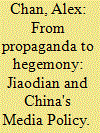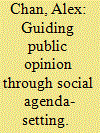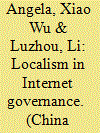|
|
|
Sort Order |
|
|
|
Items / Page
|
|
|
|
|
|
|
| Srl | Item |
| 1 |
ID:
134308


|
|
|
|
|
| Summary/Abstract |
The student-led anti–media-monopoly movement in Taiwan has generated strong momentum since mid-2012. In early 2013, the National Communications Commission responded by drafting the “Prevention of Broadcasting and Television Monopoly and the Maintenance of Diversity Act”, which was approved by the Executive Yuan in April 2013 and is now waiting to be debated in the Legislative Yuan. In contemporary Taiwan, the social is often connected with the political. The existing democratic system, which is a legacy of the democratisation process in the twentieth century, no longer seems adequate to serve the citizens of the twenty-first century. This paper considers the anti-media-monopoly movement and the burgeoning civic movements in recent years as part of a “second wave” of democratisation for further political reform and democratic consolidation. When martial law was lifted in Taiwan in 1987, the “first wave” of media liberalisation ended with the commercialisation of industry. The “second wave” of media democratisation has picked up where the first wave left off and may finally establish, through increasingly more thoughtful media policies, a better and fairer media environment that is more suitable for democratic Taiwan.
|
|
|
|
|
|
|
|
|
|
|
|
|
|
|
|
| 2 |
ID:
021206


|
|
|
|
|
| Publication |
Feb 2002.
|
| Description |
35-52
|
|
|
|
|
|
|
|
|
|
|
|
|
|
|
|
| 3 |
ID:
080492


|
|
|
|
|
| Publication |
2007.
|
| Summary/Abstract |
Guidance of public opinion (yulun daoxiang) became the buzzword of the Chinese government's media policy from the 1990s. I illustrate this idea through borrowing the concept of agenda-setting from media studies. Partly, its introduction was a response to the crisis of the propaganda model in the mid-1980s. Recognizing its declining ability to control what people think, the party state shifted its focus from political ideology to social agenda. The guidance of public opinion is indirect, flexible and subtle in nature. It allows the state-controlled media to address people's daily concerns. Also, it realizes that responsiveness to public opinion is the key to guiding that opinion effectively. The media need to guide public opinion 'correctly', so as to promote political unity, social stability, and boost morale. An argument is advanced that the party state seeks to accomplish attention management through agenda-setting
|
|
|
|
|
|
|
|
|
|
|
|
|
|
|
|
| 4 |
ID:
186853


|
|
|
|
|
| Summary/Abstract |
Often analysing ‘the Chinese Internet’ as a national entity, existing research has overlooked China's provincially oriented web portals, which have supplied information and entertainment to substantial user populations. Through the lenses of the critical political economy of media and critical media industry studies, this article traces the ascendance of China's provincial web from the late 1990s to the early 2000s by analysing industry yearbooks, official reports, conference records, personal memoirs, archived webpages, and user traffic data. We uncover interactions between Internet service providers, legacy media organizations, commercial Internet companies, and the central and local governments – each driven by discrete economic interests, political concerns, and imaginaries about the new technology. Delineating the emergence and consolidation of China's provincial web, our study foregrounds the understudied political economy of online content regionalization at scale. Further, it sheds new light on Chinese media policy, Internet governance, and Internet histories, especially the widely noted conservative turn of online cultures after the mid-2010s.
|
|
|
|
|
|
|
|
|
|
|
|
|
|
|
|
|
|
|
|
|